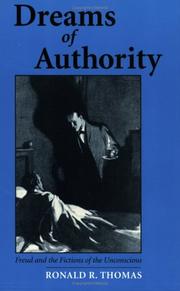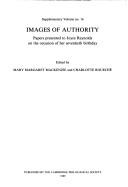| Listing 1 - 10 of 18 | << page >> |
Sort by
|
Book
ISBN: 0776197010 Year: 1976 Publisher: [Montréal] : Leméac,
Abstract | Keywords | Export | Availability | Bookmark
 Loading...
Loading...Choose an application
- Reference Manager
- EndNote
- RefWorks (Direct export to RefWorks)
Book
ISBN: 9782745313591 2745313592 Year: 2007 Volume: 98 Publisher: Paris : Champion,
Abstract | Keywords | Export | Availability | Bookmark
 Loading...
Loading...Choose an application
- Reference Manager
- EndNote
- RefWorks (Direct export to RefWorks)
Book
ISBN: 9782841747108 Year: 2015 Volume: *102 Publisher: Paris : Editions Kimé,
Abstract | Keywords | Export | Availability | Bookmark
 Loading...
Loading...Choose an application
- Reference Manager
- EndNote
- RefWorks (Direct export to RefWorks)
Des contributions sur le rapport entre auteur et autorité, qui montrent comment certains écrivains démolissent des modèles littéraires, sapent le prestige de la science ou font vaciller certitudes et valeurs établies. Elles s'attachent également à l'autorité que revendique l'auteur ou qui émane directement d'une oeuvre originale. L'autorité du texte en tant que telle est également considérée. ©Electre 2015
Authority in literature --- Canon (Literature) --- Literature --- Autorité dans la littérature --- Chefs-d'oeuvre (Littérature) --- Littérature --- Philosophy --- Philosophie --- Autorité dans la littérature --- Chefs-d'oeuvre (Littérature) --- Littérature
Book
ISBN: 5955100199 Year: 2004 Publisher: Moskva : I͡Azyki slavi͡anskoĭ kulʹtury,
Abstract | Keywords | Export | Availability | Bookmark
 Loading...
Loading...Choose an application
- Reference Manager
- EndNote
- RefWorks (Direct export to RefWorks)
Russian literature --- Authority in literature --- Political science --- Politics and literature --- Lttérature russe --- Autorité dans la littérature --- Science politique --- Politique et littérature --- Themes, motives. --- Terminology --- Thèmes, motifs --- Terminologie
Book
ISBN: 9782753512429 2753512426 275354719X Year: 2010 Volume: *83 Publisher: Rennes : Presses Universitaires de Rennes,
Abstract | Keywords | Export | Availability | Bookmark
 Loading...
Loading...Choose an application
- Reference Manager
- EndNote
- RefWorks (Direct export to RefWorks)
La crise de l’autorité, dont les origines remontent au seizième siècle et qui est susceptible de définir jusqu’à nos jours toute la période moderne, n’empêche pas la notion d’autorité de conserver sa pertinence et sa fonction régulatrice dans l’ordre de la littérature, où elle aide à penser l’idée d’auteur. C’est l’hypothèse dont ce volume procède, en regroupant tous les articles qu’a suscités le Groupe φ au long de deux années de séminaire et au terme d’un colloque international – à l’instar des programmes et des ouvrages précédents du Groupe (Littératures sous contrat, L’engagement littéraire, Littérature et exemplarité). Il s’est agi, pour un ensemble d’une quarantaine de chercheurs, de relever dans une perspective de théorie littéraire le défi lancé en philosophie politique par Hannah Arendt dans La Crise de la culture : « En pratique aussi bien qu’en théorie, nous ne sommes plus en mesure de savoir ce que l’autorité est réellement. ». La faillite pluri-séculaire de l’autorité comme tradition, et la critique moderne et contemporaine de l’auctorialité comme garantie du sens, promeuvent des formes singulières et paradoxales de fonction-autorité ou d’effet-autorité en littérature, en suscitant les modalités originales de leur reconnaissance ou de leur contestation. Quatre mouvements composent ce volume, qui s’achève sur un épilogue (étude et entretien) consacré par Jean-Louis Jeannelle à l’œuvre critique de Susan R. Suleiman, professeure à l’Université de Harvard.
Literature --- Authority in literature --- Littérature --- Autorité dans la littérature --- Philosophy. --- Philosophie --- Litterature --- Autorite dans la litterature --- Auteur (esthétique) --- Autorité --- autorité --- Art d'écrire. --- Autorité. --- Thème littéraire. --- Congrès. --- Dans la littérature --- littérature --- Littérature --- Autorité dans la littérature --- Literature (General) --- auteur --- esthétique
Book
ISBN: 9789004215153 9789004215177 9004215158 9786613334909 1283334909 9004226435 9789004226432 9781283334907 6613334901 Year: 2012 Volume: 20 Publisher: Leiden Brill
Abstract | Keywords | Export | Availability | Bookmark
 Loading...
Loading...Choose an application
- Reference Manager
- EndNote
- RefWorks (Direct export to RefWorks)
This book examines scriptural authority and its textual and visual instruments, asking how words and images interacted to represent and by representing to constitute authority, both sacred and secular, in Northern Europe between 1400 and 1700. Like texts, images partook of rhetorical forms and hermeneutic functions – typological, paraphrastic, parabolic, among others – based largely in illustrative traditions of biblical commentary. If the specific relation between biblical texts and images exemplified the range of possible relations between texts and images more generally, it also operated in tandem with other discursive paradigms – scribal, humanistic, antiquarian, historical, and literary, to name but a few – for the connection, complementary or otherwise, between verbal and visual media. The Authority of the Word discusses the ways in which the mutual form and function, manner and meaning of texts and images were conceived and deployed in early modern Europe. Contributors include James Clifton, John R. Decker, Maarten Delbeke, Wim François, Jan L. de Jong, Catherine Levesque, Andrew Morrall, Birgit Ulrike Münch, Carolyn Muessig, Bart Ramakers, Kathryn Rudy, Els Stronks, Achim Timmermann, Anita Traninger, Peter van der Coelen, Geert Warnar, and Michel Weemans.
History of civilization --- inscriptions --- anno 1400-1499 --- anno 1600-1699 --- anno 1500-1599 --- Europe: North --- Symbolism in communication --- Authority in literature --- Authority in art --- Symbolisme dans la communication --- Autorité dans la littérature --- Autorité dans l'art --- Bible --- Evidences, authority, etc. --- Illustrations --- Conferences - Meetings --- Autorité dans la littérature --- Autorité dans l'art --- Communication --- Biblia --- BIOGRAPHY & AUTOBIOGRAPHY / Literary. --- Authority in literature - Congresses --- Authority in art - Congresses --- Symbolism in communication - Europe, Northern - Congresses --- Illustrations.

ISBN: 0801424240 0801496942 Year: 1990 Publisher: Ithaca, N.Y. : Cornell University Press,
Abstract | Keywords | Export | Availability | Bookmark
 Loading...
Loading...Choose an application
- Reference Manager
- EndNote
- RefWorks (Direct export to RefWorks)
Authority in literature --- Dreams in literature --- English fiction --- Psychoanalysis and literature --- Subconsciousness in literature --- Autorité dans la littérature --- Rêves dans la littérature --- Roman anglais --- Psychanalyse et littérature --- Inconscient dans la littérature --- History and criticism --- Histoire et critique --- Freud, Sigmund, --- Authority in literature. --- Dreams in literature. --- Psychological fiction, English --- Subconsciousness in literature. --- History and criticism. --- Autorité dans la littérature --- Rêves dans la littérature --- Psychanalyse et littérature --- Inconscient dans la littérature

ISBN: 0906014158 9780906014158 Year: 1989 Volume: 16 Publisher: Cambridge : Cambridge Philological Society,
Abstract | Keywords | Export | Availability | Bookmark
 Loading...
Loading...Choose an application
- Reference Manager
- EndNote
- RefWorks (Direct export to RefWorks)
Classical philology --- Authority in literature --- Authority in art --- Philologie ancienne --- Autorité dans la littérature --- Autorité dans l'art --- Reynolds, Joyce Marie --- Greece --- Grèce --- Civilization --- Civilisation --- Classical philology. --- Authority. --- Authority --- Reynolds, Joyce Maire --- Philology, Classical --- Classical antiquities --- Greek language --- Greek literature --- Greek philology --- Humanism --- Latin language --- Latin literature --- Latin philology --- Political science --- Authoritarianism --- Consensus (Social sciences) --- Reynolds, Joyce --- Reynolds, J. --- Autorité dans la littérature --- Autorité dans l'art --- Grèce --- Reynolds, Joyce Maire.
Book
ISBN: 9782251420271 2251420274 Year: 2005 Volume: 24 Publisher: Paris : Les Belles Lettres,
Abstract | Keywords | Export | Availability | Bookmark
 Loading...
Loading...Choose an application
- Reference Manager
- EndNote
- RefWorks (Direct export to RefWorks)
Greek poetry, Hellenistic --- Narration (Rhetoric) --- Truth in literature. --- Authority in literature. --- Poésie grecque hellénistique --- Narration --- Vérité dans la littérature --- Autorité dans la littérature --- History and criticism. --- History --- Histoire et critique --- Histoire --- Poetics --- Poésie grecque hellénistique --- Vérité dans la littérature --- Autorité dans la littérature --- Authority in literature --- Truth in literature --- History and criticism --- Rhetoric --- Discourse analysis, Narrative --- Narratees (Rhetoric) --- Greek poetry, Hellenistic - History and criticism. --- Narration (Rhetoric) - History - To 1500. --- Poetics - History - To 1500. --- Acqui 2006
Book
ISBN: 0691067430 0691601852 069163145X 1306986516 140085962X Year: 1988 Publisher: Princeton, N.J. : Princeton University Press,
Abstract | Keywords | Export | Availability | Bookmark
 Loading...
Loading...Choose an application
- Reference Manager
- EndNote
- RefWorks (Direct export to RefWorks)
From the Revolutionary War to the Civil War, a familiar scene appears and reappears in American literature: a speaker stands before a crowd of men and women, attempting to mitigate their natural suspicions in order to form a body of federated wills. In this important study of the relationship of literature and politics, Mark Patterson argues that this scene restates political issues in literary terms and embodies the essential problems of American democracy facing both politicians and writers: What is autonomy? How does representation work? Where does true authority lie? Beginning with the debate over ratification of the United States Constitution, Patterson follows out the complex literary consequences of these questions.A work of literary history and criticism, this study also offers valuable insights into matters of political and literary theory. In separate chapters on Benjamin Frankin, Hugh Henry Brackenridge, and Charles Brockden Brown in the post-Revolutionary period and on Fenimore Cooper, Emerson, and Melville in the antebellum period, Patterson provides a series of brilliant readings of major texts in order to describe how American writers have conflated political and literary concerns as a means to their own social authority.Originally published in 1988.The Princeton Legacy Library uses the latest print-on-demand technology to again make available previously out-of-print books from the distinguished backlist of Princeton University Press. These editions preserve the original texts of these important books while presenting them in durable paperback and hardcover editions. The goal of the Princeton Legacy Library is to vastly increase access to the rich scholarly heritage found in the thousands of books published by Princeton University Press since its founding in 1905.
American literature --- Politics and literature --- Authority in literature --- Autonomy in literature --- Representative government and representation in literature --- Littérature américaine --- Politique et littérature --- Autorité dans la littérature --- History and criticism --- Histoire et critique --- United States --- Etats-Unis --- History --- Literature and the revolution --- Histoire --- Littérature et révolution --- 1783-1850 --- 19th century --- Revolutionary period, 1775-1783 --- Revolution, 1775-1783 --- Literature and the revolution. --- Representative government and representation in literature. --- Authority in literature. --- Autonomy in literature. --- History and criticism. --- Intellectual life
| Listing 1 - 10 of 18 | << page >> |
Sort by
|

 Search
Search Feedback
Feedback About UniCat
About UniCat  Help
Help News
News